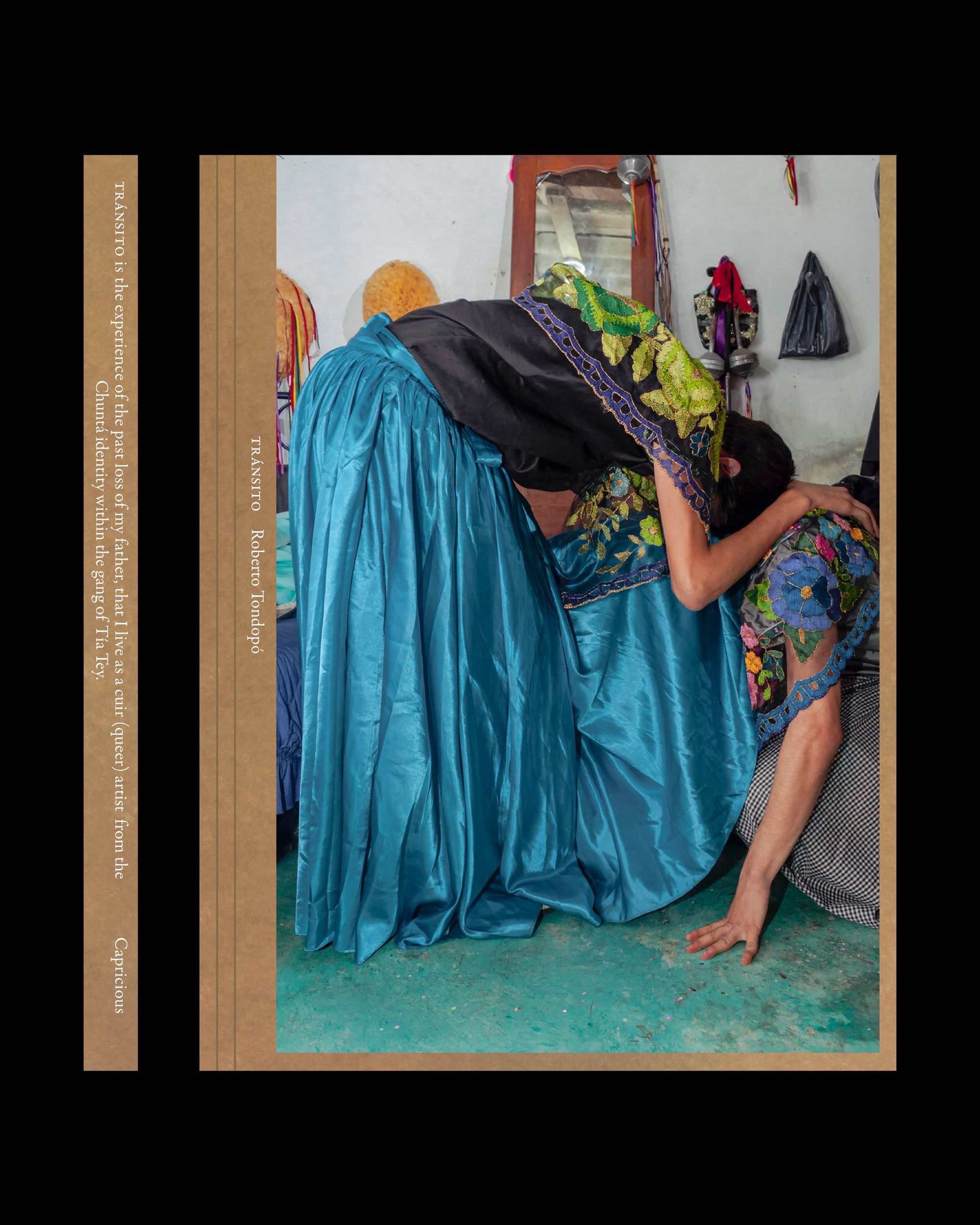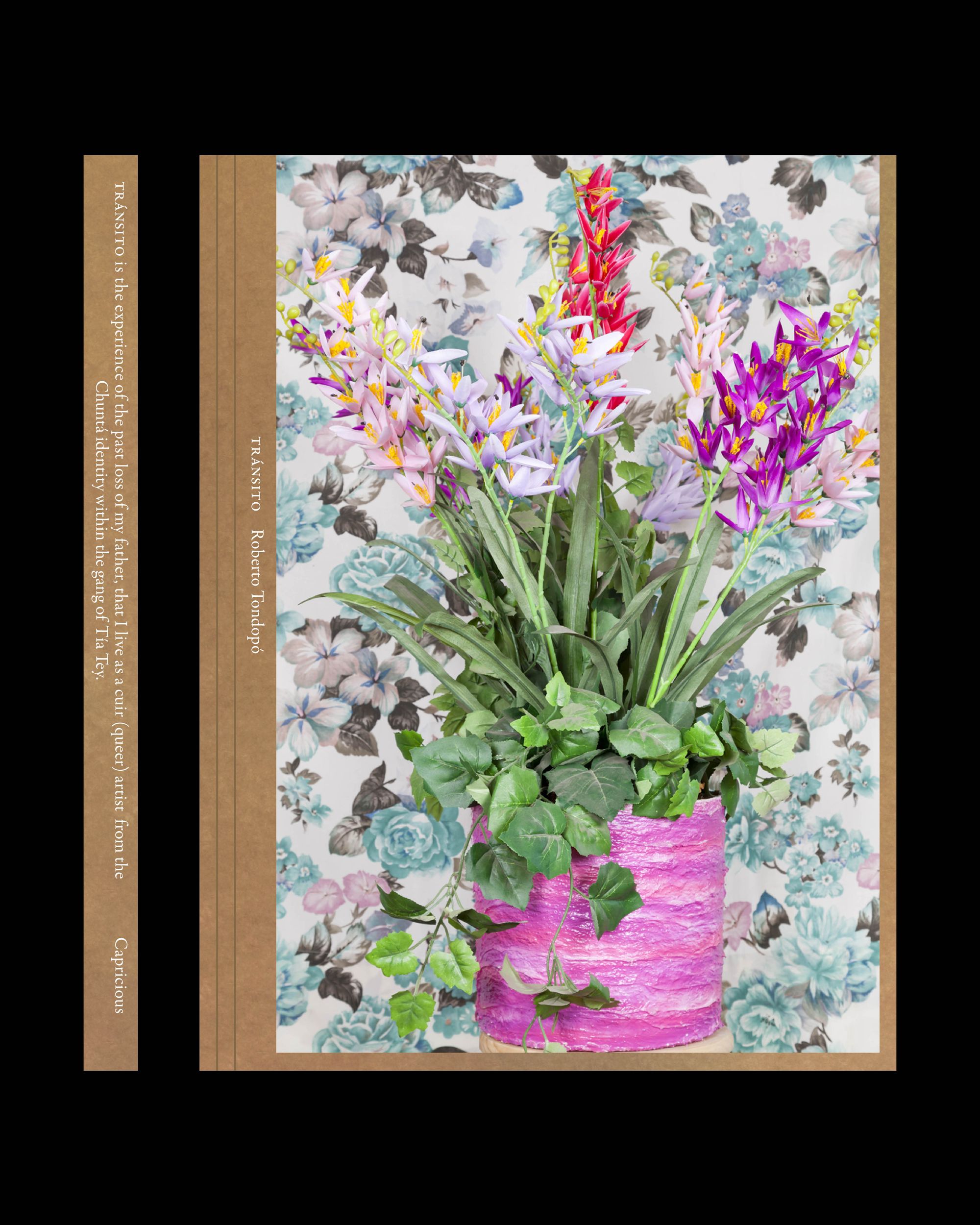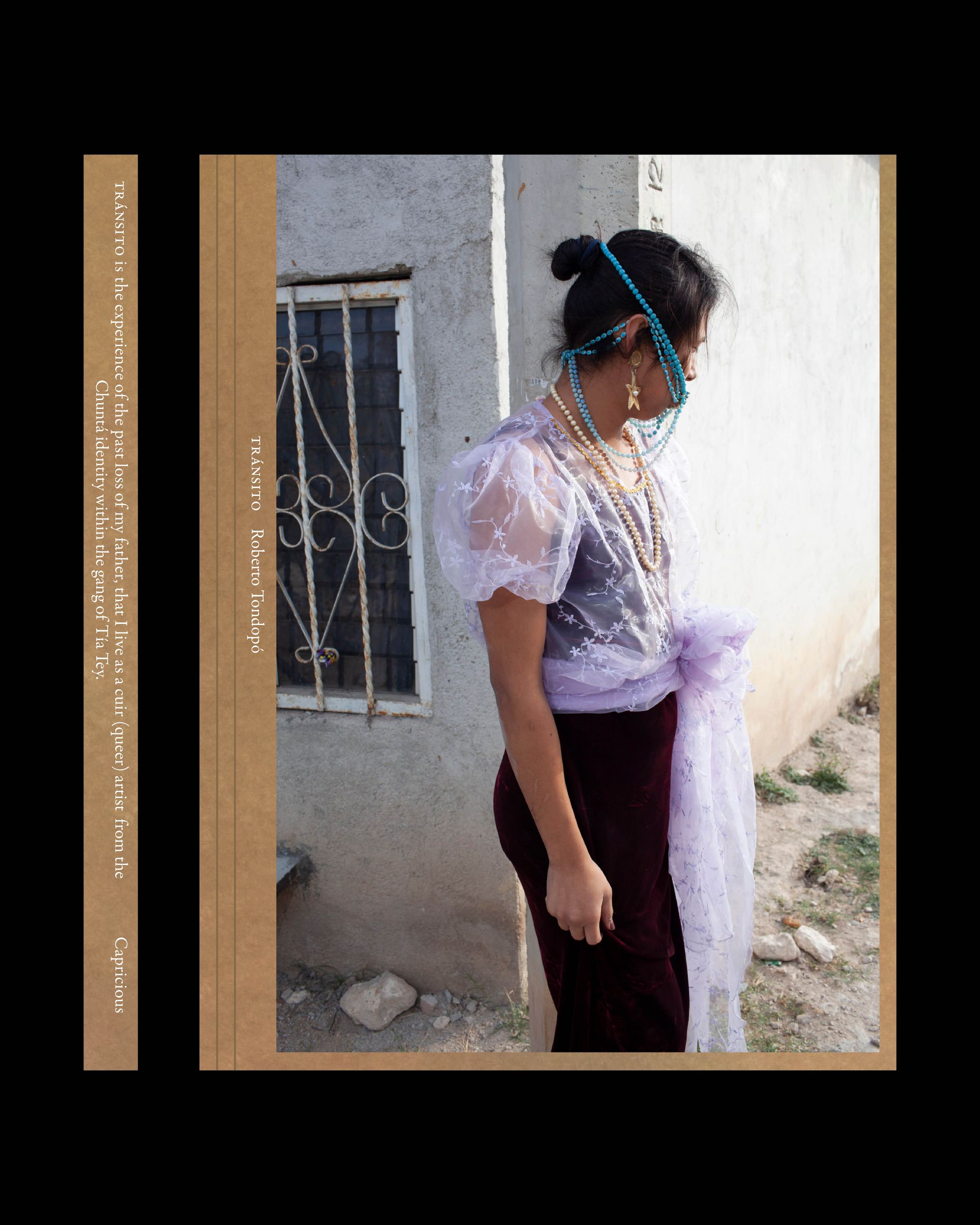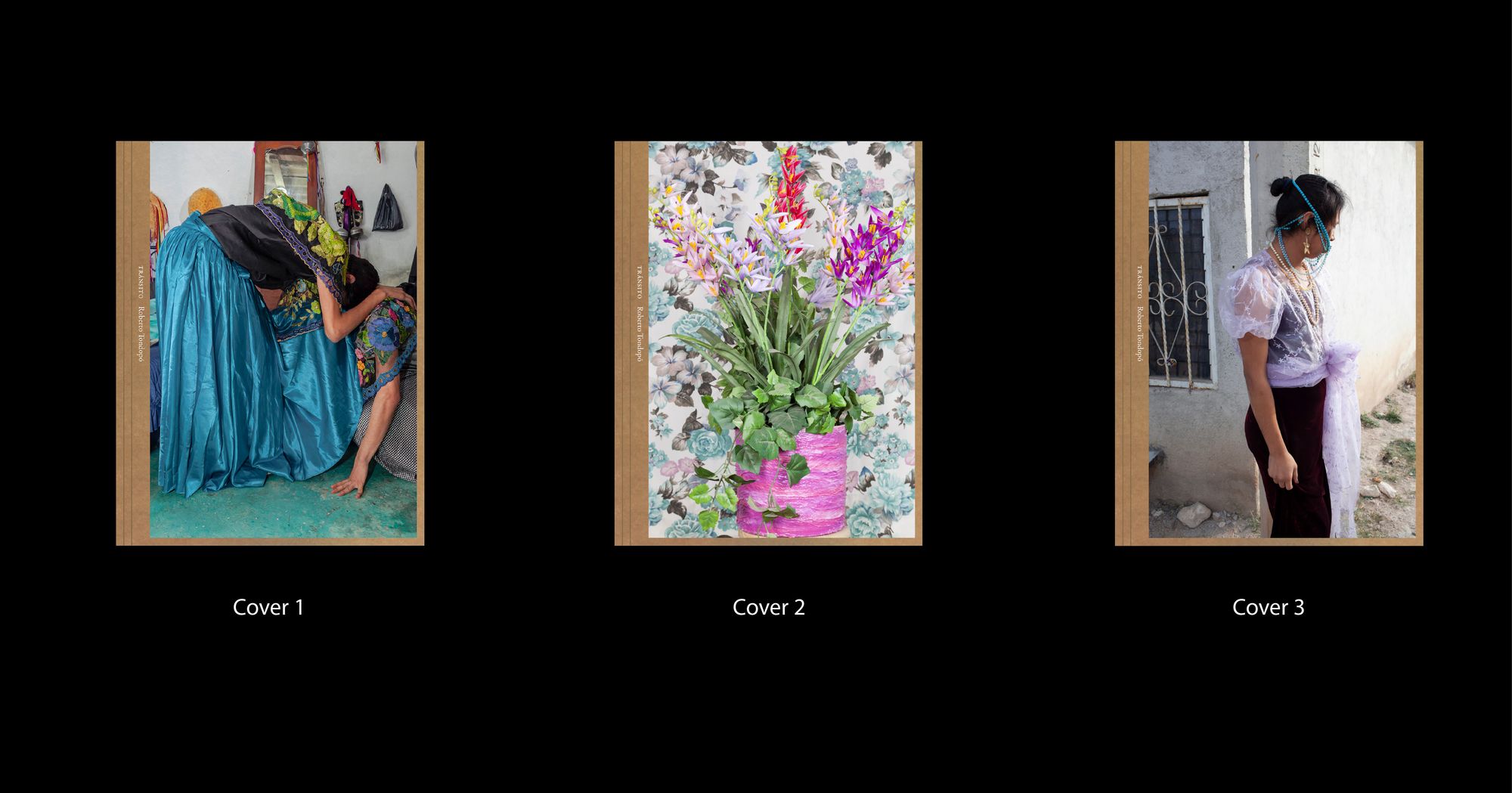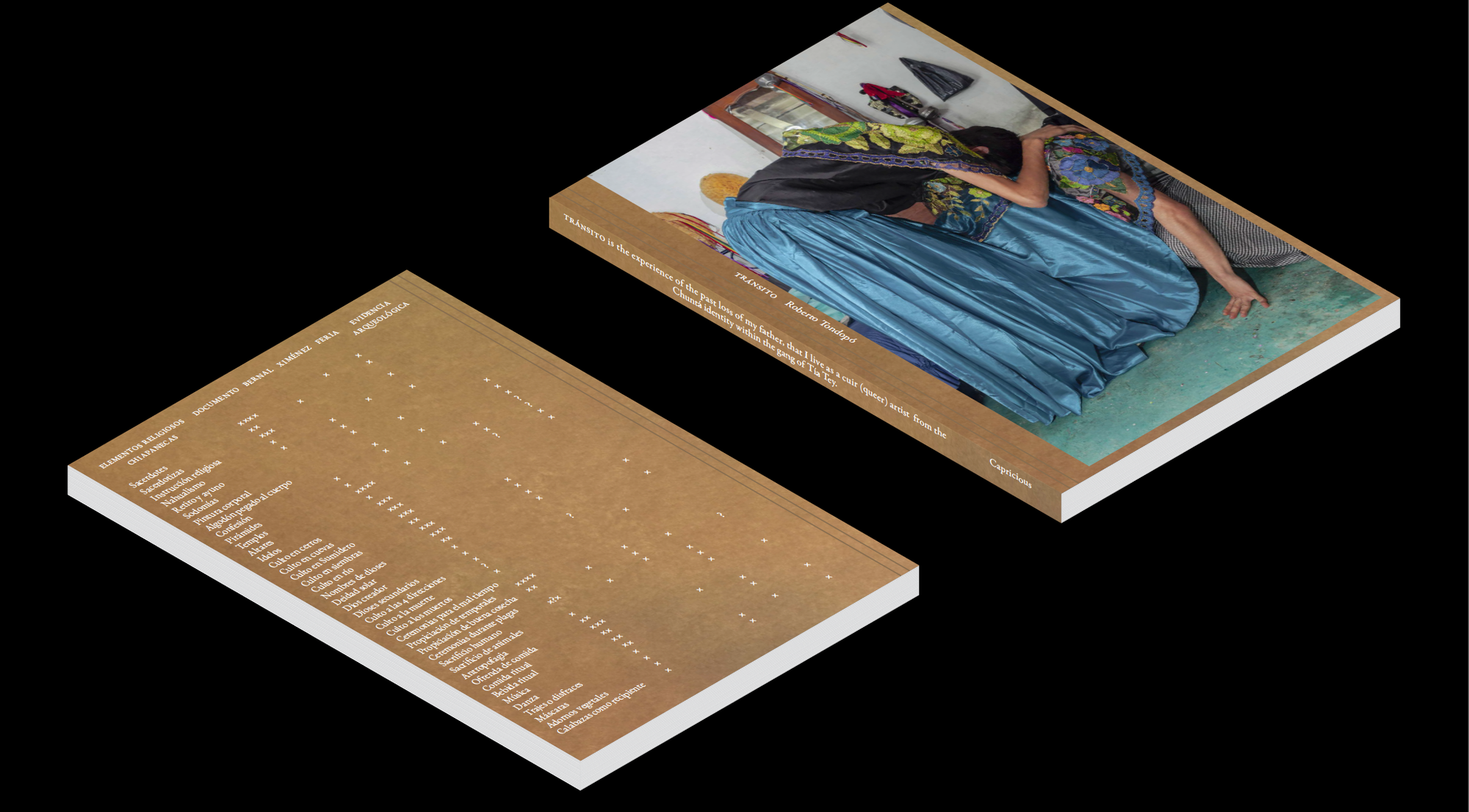PRE-ORDER: TRÁNSITO
Rooted in personal history and collective tradition, TRÁNSITO weaves together the death of Tondopó’s father—named Tránsito and born in Chiapa de Corzo, Mexico—with the artist’s participation in the Fiesta Grande, a local celebration held in honor of Saint Sebastian. Central to this festival is the tradition of the Chuntá, in which men dress as women, embodying a celebratory ritual of gender performance. By becoming a Chuntá himself, Tondopó offers both a tribute to his father and reflection on mourning as metamorphosis.
Arraigado en la historia personal y la tradición colectiva, TRÁNSITO entrelaza la muerte del padre de Tondopó —de nombre Tránsito y nacido en Chiapa de Corzo, Chiapas, México— con la participación del artista en la Fiesta Grande, una celebración local en honor a San Sebastián. Central en este festival es la tradición de la Chuntá, en la que hombres se visten de mujer, encarnando un ritual festivo de performance de género. Al convertirse él mismo en Chuntá, Tondopó ofrece tanto un homenaje a su padre como una reflexión sobre el duelo como metamorfosis.
Yet, against the backdrop of colonial legacies and the syncretic blend of Catholicism and Indigenous spirituality, the Fiesta Grande holds a striking paradox: a conservative community embracing a public ritual rooted in gender fluidity. This inherent tension becomes a site of inquiry for Tondopó’s broader interest in the instability of seemingly fixed positions such as masculinity, sexuality, and national heritage.
Sin embargo, en el contexto de los legados coloniales y la mezcla sincrética del catolicismo y la espiritualidad indígena, la Fiesta Grande presenta una paradoja notable: una comunidad conservadora que abraza un ritual público fundamentado en la fluidez de género. Esta tensión inherente se convierte en un espacio de investigación para el interés más amplio de Tondopó en la inestabilidad de posiciones aparentemente fijas como la masculinidad, la sexualidad y la herencia nacional.
"I identify with people that occupy intermediate states of being—an intertwining of stories and identities. The images also occupy this hybrid place." -Tondopó
“Me identifico con personas que ocupan estados intermedios del ser, un entrelazamiento de historias e identidades. Las imágenes también ocupan este lugar híbrido.” -Tondopó
Through lush allegorical imagery that blurs the line between documentary and fiction, TRÁNSITO becomes a crossing; a passage through composite identities and layered collective histories. Tondopó interprets the Chuntá tradition as a sacred embodiment—a fragmented figure that mirrors the pierced body of Saint Sebastian. In this act of ritualized transfiguration, the normative self is destabilized, making space for a subversive blurring of identity. Tondopó’s photographs invoke liminal states, conjuring decolonized forms of embodiment separate from western dichotomies and borders.
A través de una efervescente imaginería alegórica que difumina las fronteras entre el género documental y la ficción, TRÁNSITO se convierte en un cruce; un pasaje por identidades compuestas y memorias colectivas superpuestas. Tondopó interpreta la tradición del Chuntá como una encarnación sagrada —una figura fragmentada que refleja el cuerpo perforado de San Sebastián. En este acto de transfiguración ritualizada, el yo normativo se desestabiliza, dando lugar a un difuminado subversivo de la identidad. Las fotografías de Tondopó invocan estos estados liminales, conjurando formas descolonizadas de encarnación separadas de las dicotomías y fronteras occidentales.
TRÁNSITO moves with a kinetic fluency, flowing from the dense crowds of the feast to quiet moments of adornment. The work resists closure, instead unfolding as a visual poetics of becoming:hybrid, transitional, mutable. Through ritual, costumes, gestures and bodies of the Chuntás, TRÁNSITO forms a dance of relationships in metamorphosis where lineage, territory and dissent come together.
TRÁNSITO se mueve con una fluidez cinética, fluyendo desde la densa multitud de la fiesta hasta los momentos tranquilos de adorno. La obra resiste el cierre, desplegándose en cambio como una poética visual del devenir: híbrida, transicional y mutable. A través del ritual, el vestuario, los gestos y cuerpos de las Chuntás, TRÁNSITO forma una danza de relaciones en metamorfosis donde se unen linaje, territorio y disidencia.
TRÁNSITO is edited by Fernando Gallegos and includes an essay by Roberto Tondopó, edited by Duen Neka'hen Sacchi, in English and Spanish with translations by Beatriz Llenín Figueroa. The monograph is full color, 208 pages, Japenese fold. Cover with tipped in photograph, in three variants. Designed by Studio Lin. Limited edition of 500.
TRÁNSITO es editado por Fernando Gallegos e incluye un ensayo de Roberto Tondopó, editado por Duen Neka'hen Sacchi, en inglés y español con traducciones de Beatriz Llenín Figueroa. La monografía es a todo color, 208 páginas, plegado en japonés. Cubierta con fotografía insertada, en tres variantes. Diseño de Studio Lin. Edición limitada de 500.
208 pages, Japanese fold. Cover with tipped on photo in three variants.
Special pre-order price of $60.
2026
ISBN: 978-1-7346562-6-8
208 pages
7.5 x 10 inches
